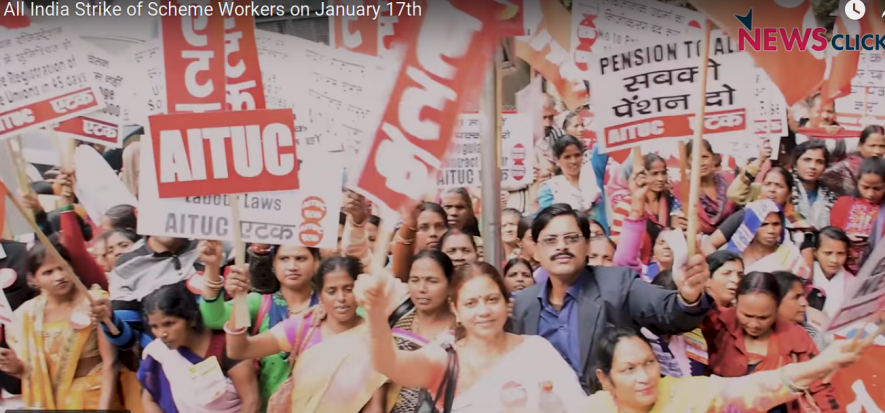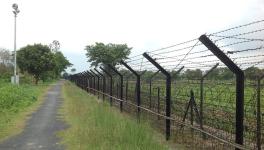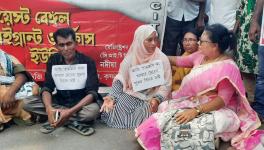Why You Must Pay Attention to the All-India Scheme Workers Strike

On 17 January, more than 50 lakh workers under central government schemes will participate in a nationwide strike and demonstrate at district headquarters across the country, on a call given by 10 central trade unions.
More than one crore workers—mainly women—have been providing essential care-giving services to the country’s population in critical areas like health, nutrition and education.
But these women are not recognised as ‘workers’ at all — ostensibly, because they are employed under the various ‘schemes’ run by the central government, rather than having ‘regular’ government jobs.
Instead, these scheme workers are considered ‘volunteers’ or even ‘activists’.
Not only are they underpaid for their services, which are usually more than what regular employees are expected to do, and denied minimum wages, they are even denied regularity of pay. Needless to say, they get none of the other benefits that government workers take for granted.
These scheme workers include around 27 lakh Anganwadi, Mini-Anganwadi workers and helpers under the Integrated Child Development Services Scheme (ICDS), nearly 28 lakh workers under the Mid-Day Meal (MDM) scheme, about 10 lakh ASHA (Accredited Social Health Activist) workers as well as USHA (Urban Social Health Activist) workers under the National Health Mission (NHM) and between 2-3 lakh Auxiliary Nurse Midwives (ANMs) under the NHM. Besides, lakhs are working under schemes like the Sarva Shiksha Abhiyan (SSA), National Rural Livelihoods Mission (NRLM), National Child Labour Project (NCLP), Small Savings Schemes, etc.
The vast majority of these workers are women, especially Anganwadi workers, ASHA/USHA workers, ANMs and MDM workers.
These women workers provide care-giving services, without which production and social reproduction in the country would come to a screeching halt.
Anganwadi workers under ICDS are responsible for the development of children—children who belong to the most socially and economically deprived backgrounds—taking care of new and expecting mothers as well as the infants’ supplementary nutrition, healthcare, pre-school education, etc.
Similarly, ASHAs are critical to the health of pregnant women, identifying them and ensuring they receive the requisite medical care. They also ensure that these pregnant women receive institutional delivery, which requires them to accompany the women in labour at any odd hour in the day or night.
As for the ANMs, they work at the sub-centres, and are therefore considered the first point of contact between the community and health services.
But apart from these critical services—which form the backbone of the health of women and children across the country—they are also given a long list of other jobs to do, such as conducting surveys, etc. They are required to render these services while also performing their regular services.
And yet, while Anganwadi workers are paid a a pittance as ‘honorarium’, instead of regular salary, the ASHA workers are not even paid that. They get paid an incentive on a piece rate basis, that if you do this much amount of work, you will get paid this much. On top of all this, there are the budget cuts that the various schemes are suffering from.
“The functioning of the schemes is being affected due to the budget cuts,” said A R Sindhu, general secretary of All India Federation of Anganwadi Workers and Helpers, speaking to Newsclick earlier.
“In the 2015-16 Union budget, the Centre had drastically cut down the budget allocation for ICDS to mere Rs.8335.77 in 2015-16 from Rs. 18,195 crores from the previous year. The allocation for MDM schemes was cut short from 13 thousand crores to 9 thousand crores too.”
It is important to understand that through these schemes, the government is short-changing both the workers and the citizens.
As Dr K Hemalata, President of the Centre of Indian Trade Unions (CITU) has earlier pointed out, providing for the basic needs of people in critical areas like education, health, food and nutrition is indispensable for the development of our country. However, instead of providing these services to the people as entitlements and as rights, the government chooses to start ‘schemes’ for their provision. Not only can these schemes be closed at any point in time as temporary measures, she says, but the government is also not providing adequate financial resources for these schemes.
On the other hand, the workers are obviously being cheated and exploited.
Then there is the fact that since most of these workers are women, there is the patriarchal assumption that care-giving is “women’s work” anyway and hence does not need to be accounted for much. So much that they do not even deserve regular wages commensurate with the amount and nature of work they do. This aspect of ideological duress contributes to making these scheme workers invisible.
In May 2013, the 45th session of the Indian Labour Conference (ILC) had recommended that the central government recognise the scheme workers as workers, that they be paid minimum wages and be provided social security benefits, including pension and recognise their right to organise and collectively bargain.
The demands that the scheme workers will be agitating for include:
1) Implementation of recommendations of the 45th ILC that scheme workers be given recognition as workers, minimum wages not less than Rs.18,000 per month and social security including monthly pension not less than Rs. 3000. Scheme workers must be given coverage under Employees Provident Fund (EPF) and Employees' State Insurance (ESI).
2) Adequate financial allocation in the Union Budget 2018-19 for the centrally sponsored schemes under which these workers are employed—which include ICDS, MDMS, NHM, SSA, NCLP, etc—to ensure not only increase in wages of workers to the minimum wage level but also to achieve universalisation of the schemes with adequate infrastructure and quality services.
3) An end to the privatisation of the schemes in any form and no subversion by way of cash transfer or exclusion of beneficiaries. The Modi government has been trying to privatise these schemes, for example in the MDM scheme, and involving corporates and NGOs such as Vedanta, JP Cements, Nandi Foundation, ISKON etc.
This is why the upcoming nationwide 17 January protest is not only significant for the country but historic.
Get the latest reports & analysis with people's perspective on Protests, movements & deep analytical videos, discussions of the current affairs in your Telegram app. Subscribe to NewsClick's Telegram channel & get Real-Time updates on stories, as they get published on our website.























